3rd Biennial National Conference on Early Childhood Care and Education National Action Plan for 2013-2014: Sharing Progress |27 February 2015
A conference with a difference…..
Seychelles hosted its 3rd Biennial National Conference on Early Childhood Care and Education (ECCE) under the theme “National Action Plan for ECCE 2013-2014: Sharing Progress” on February 20-21, 2015.
The conference, which was jointly organised by the National High Level ECCE Policy Committee and the Institute of Early Childhood Development (IECD), gave all stakeholders and partners the opportunity to share their achievements, participate and discuss on progress made at the level of each of the main Sectors in the implementation of the National Action Plan for ECCE 2013-2014 and discuss challenges in ECCE for the past two years.
“No child should be left behind. By fulfilling the rights of all young children and nurturing their potential and 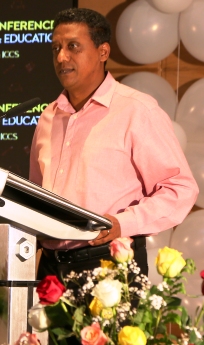 well-being, we will be building the wealth of nations.”
well-being, we will be building the wealth of nations.”
This was said by Vice-President Danny Faure as he officially launched the 3rd Biennial Conference on Early Childhood Care and Education (ECCE) at the Eden Bleu Hotel, Eden Island on February 20, 2015.
Mr Faure made a review of the achievements in the area of ECCE since the first Unesco World Conference on ECCE held in Moscow in September 2010. He said the Framework reiterates that ECCE is a right and an indispensable foundation for lifelong learning and inclusive development with proven benefits in health, education, nutrition, gender equity, greater employability and earnings and overall a better quality of life.
“Seychelles prides itself on having achieved Universal Primary Education and the Seychelles MDG 2010 status report states that we have achieved all MDG targets and set ourselves MDG +targets.
Through national legislation our children have access to a comprehensive, preventive medical care including well-baby milestone checks, immunisation programmes and response to emergency needs, while the mothers receive good quality services before, during and after giving birth.
Our national laws also promote child protection and care for disadvantaged children.
Parents have access to programmes designed to support and strengthen their parenting skills through emotional support and education on child development and early care.
Political commitment on the part of government has ensured that the highest national budgets are allocated to Education and Health, allowing for expansion and improvement of facilities and services for all young children from birth onwards,” Vice-President Faure said.
In his concluding remarks, Mr Faure said that “IECD will also, as part of its advocacy strategies, carry out outreach programmes to promote the importance of ECCE across the business sector so that companies and private individuals could either start or increase their investments in our young children’s development and look at it as an investment for the future of their enterprises and the nation as a whole”.
A series of presentations were made by both international and local speakers which showed and confirmed the progress made so far in ECCE, both globally and locally.
Some of the experts who gave presentations were Dr Mmansetsa Marope, Director International Bureau of Education, Unesco; Professor Andrew Hills, Professor of Allied Research- Maternity and Neonatology, Queensland University, Australia; and Rebecca Sayre, Early Childhood Development (ECD) specialist at World Bank – New York USA.
Others who presented their sectoral ECCE projects were Betty-Mai Sofa, Senior Policy Analyst at the department of community development and sports; Anne-Marie Bibi, National Programme Manager for Child Health and the chairperson for the Early Childhood Care and Education Technical Team within the Ministry of Health; Judy Brioche – part-time Programme Coordinator for the Antenatal Parenting Programme at the department of social affairs and Elva Gedeon – Senior Curriculum Development Officer in the Division for Curriculum Assessment and Teacher Support in the Ministry of Education.
Dr Andre Leste, Director Programme Development at the Institute of Early Childhood Development, gave an overview of the Evaluation of the National Action Plan for ECCE 2013-2014.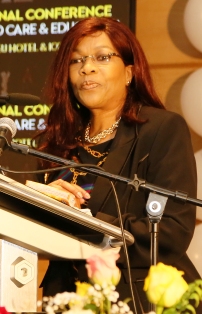 Following are summaries of their presentations:
Following are summaries of their presentations:
Dr Marope’s keynote address was entitled “Global Progress on ECCE Provision: Challenges for Post-2015. She outlined the development and education rationales for investing in ECCE and talked about the increasing global recognition of ECCE. Dr Marope said that despite growing global recognition of ECCE and growing evidence on the benefits of ECCE, a large proportion of countries invest well under 5% of their primary education budget in ECCE. As such, progress in the provision of quality ECCE services remains inadequate and uneven.
Progress on care - Dr Marope said that from 1990 to 2013, the global maternal mortality ratio declined by 45 per cent, from 380 deaths to 210 deaths per 100,000 live births. However, Dr Marope said that the decline in maternal mortality since 1990 is not fast enough to meet the MDG target of reduction by three quarters by 2015.
Antenatal visits - Globally, only half of pregnant women receive the minimum of at least four antenatal visits recommended by the World Health Organisation (WHO).
Dr Marope said that between 1990 and 2013, Nutrition – Underweight decreased from 25 per cent to 15 per cent worldwide. At the current trend, the target of halving the 1990 underweight prevalence by 2015 at the global level will not be met.
When addressing the Protection part of her keynote address, Dr Marope talked about the emotional and education progress. She said that children’s learning potential and outcomes are negatively affected by exposure to violence, abuse and child labour. Over the last decade, there is recognition that the pervasive nature and impact of violence against children has grown. Dr Marope said the biggest challenge here is systematic and reliable monitoring and consequently, realistic targeting and legal protection.
Dr Marope ended her keynote address by stating the proposed ECCE target for the post-2015 Agenda which is to increase the percentage access to quality early childhood care and education for girls and boys prior to compulsory schooling, with particular attention to the most marginalised.
In his keynote address, Professor Hills’ presentation focused on important challenges and opportunities for the 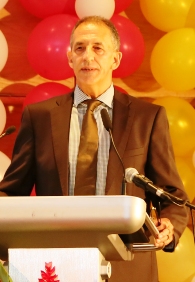 prevention of childhood obesity in the early childhood years, with particular emphasis on the role of both education and health sectors. The title of his presentation was “Prevention of Childhood Obesity: All We Need to Know for Healthy Growth and Development should be introduced in the Early Childhood Years”.
prevention of childhood obesity in the early childhood years, with particular emphasis on the role of both education and health sectors. The title of his presentation was “Prevention of Childhood Obesity: All We Need to Know for Healthy Growth and Development should be introduced in the Early Childhood Years”.
He gave an overview of childhood obesity globally, saying that rapid changes in diet and activity patterns worldwide are driving the childhood obesity epidemic. He said that many of today’s children and youths are actively discouraged from engaging in physical activities which are necessary for the development of fundamental motor skills.
Professor Hills said that an ‘eat less, move more’ mantra for healthy growth and development may be significantly strengthened by endorsing the following basic pointers: Get plenty of sleep; take every opportunity to go outside to play; play fair and be kind to others; always eat breakfast; eat all your greens and eat treats, including sweets, sugar-sweetened drinks, cakes and biscuits, sparingly.
Ms Sayre’s presentation was about the Childminding Services Standards Project. She explained that in the 2013 SABER-ECD Report, several gaps were identified in the Seychelles ECD system, including the need for standards for facilities and early learning programmes.
After the Childminding Study in 2014 carried out by IECD, it was evident that a lot of efforts had to be made to attend to health and safety aspects of childminding, establish minimum level of provision, train and support the childminders. A total of 147 childminders were captured in this research and it was established that there were about 6,000 children aged from 0-3 years of age who were being looked after by the childminders.
The national standards will target all childminders in Seychelles who provide childminding services to a maximum of 4 children or more at their home, for a fee.
In her presentation, Ms Sayre said that the standards will ensure high quality service provision by promoting consistency in quality across childminding establishments. The standards will also serve as a basis for the registration of childminders; regulation of childminding services and facilitating a national monitoring and inspection process.
The Draft Childminder Standards Framework is yet to be validated, finalised and implemented into a national regulatory framework. It is expected to be ready in June 2015.
In his overview of the Evaluation of the National Action Plan for ECCE 2013-2014, Dr Leste gave a brief on how the National Action Plan for ECCE came about; the priorities and goals of each of the ECCE sectors that have contributed in the implementation of the National Action Plan for ECCE 2013-2014; the resources that were needed to see the Evaluation Framework through its implementation/achievements stage.
Questionnaires were used to carry out the research for the evaluation of the National Action Plan (NAP) which set out to answer the following questions:
How relevant is the plan to the country’s aspiration for ECCE? To what extent have the expected outcomes been achieved? How effective have been the strategies adopted and activities carried out? What has been the impact of the National Action Plan (NAP) on ECCE? What strategies can be developed for future planning?
The ECCE technical team chairpersons from each sector were the target group as well as the whole focused group.
Dr Leste said that the next step would be to present the whole Evaluation report of the National Action Plan for ECCE 2013-2014 to the line ministries and other partners in ECCE, where it would be further validated and reviewed; then sent to the High Level ECCE Policy Committee for approval.Mrs Sofa shared the ECCE achievements and progress of the Community Development and Sports Sector. Her presentation focused on the progress made on the Kid’s Gathering Project, an initiative spearheaded by the department of community development and sports.
The project came to light following the 2013 National Child Minding Survey which highlighted the need to identify alternative common outdoor play and green areas for childminders with limited outdoor space.
The Kid’s Gathering Project will promote the social, emotional and physical development of children being cared for in childminding services. The project will also entail the provision of access to appropriate toys and learning materials in the community centre during day time.
Mrs Sofa explained that the project will be piloted in 6 districts during 6 months, starting April 2015, which would then be followed by an evaluation that would determine its replication in other districts.
The National ECCE Trust Fund has already sponsored R250,000 for the purchase of toys and educational materials. It would be the role of the district administrators to ensure that centres are kept clean at all times, the centres are secured and accessible to all childminders and that the booked days are respected. On their part, the childminders are expected to respect all established code of conduct in place and to ensure that their children are supervised at all times at the centres.
The community development and sports sector’s next step is to meet all the childminders to explain the different roles vis-à-vis the implementation of the project and to train the childminders into promoting gross and fine motor skills of the children.Mrs Brioche’s presentation was entitled “Integrating the Psychosocial component in the Antenatal Parenting Programme”. The programme aims to: promote maternal and infant wellbeing through the empowerment of parents with appropriate information and necessary skills to cope with the antenatal challenges; enhance support for fathers as their needs are often overlooked by services; fulfill existing gaps in the delivery of the antenatal and post delivery support, information and services for parents; enhance collaboration with various concerned stakeholders.
Mrs Brioche explained that since its inception, the programme has received a substantial number of participants and this number has gradually increased. It was piloted at the Seychelles Hospital as part of the Antenatal Programme in 2014 and it is now being conducted in four health centres on Mahé and one health centre on Praslin.
She said that it is very important for parents to have a Support Group to generate sharing of experience. On their part, the parents who have attended the antenatal parenting programmes said that the sessions built their self-confidence and self-esteem.
The official opening of the 3rd Biennial National Conference on ECCE also saw the launching of ‘The Seychelles Early Childhood Care and Education Terminology Directory’. The idea of the Terminology Directory Project emanated from the Seychelles Framework on Early Childhood Care and Education, translated into the National Action Plan 2013-2014.
The project has been developed and implemented by the Institute of Early Childhood Development (IECD), in collaboration with ECCE sectors. The directory will provide advice and practical tips to professionals, caregivers working with children, and facilitate communication plus information sharing between sectors, institutions and individuals active in improving the situation of children and quality of services.
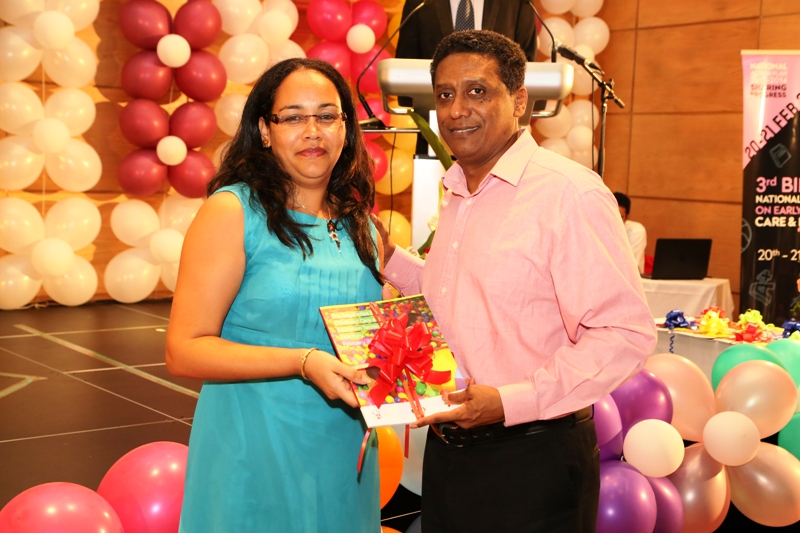
By reviewing the terms and appellations used in ECCE, the Terminology Directory will ensure: consistency; standardisation; clarity of official documents; training and professional development initiatives as well as at the point of service delivery. It can also be used as a reference guide for professionals, practitioners, parents and partners in ECCE and a means to educate the population on key terminologies and issues pertaining to early childhood development.
Copies of ‘The Seychelles Early Childhood Care and Education Terminology Directory’ were presented to Vice-President Faure, in his capacity as the chairperson of the National High Level ECCE Policy Committee and other partners in ECCE.
The production and printing of ‘The Seychelles Early Childhood and Education Terminology Directory’ has been proudly sponsored by Kannu’s Group.
In her closing speech, Dr Erna Athanasius, the ambassador for Women and Children, said that the conference has been highly successful and productive. She commended the government for organising its 3rd Biennial National Conference of Early Childhood Care and Education (ECCE) in just five years.
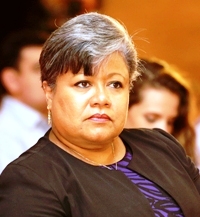 Dr Athanasius said that the conference gives all stakeholders and partners in ECCE the opportunity to come together and discuss relevant issues relating to Early Childhood Development.
Dr Athanasius said that the conference gives all stakeholders and partners in ECCE the opportunity to come together and discuss relevant issues relating to Early Childhood Development.
She said that despite the many challenges faced in ECCE services, the achievements that Seychelles has made in this area are to be envied. Also quoting Vice-President Faure, Dr Athanasius reinforced the saying that ‘no child should be left behind’.
When speaking about ‘The Seychelles Early Childhood and Education Terminology Directory’ Dr Athanasius said that it is a document to be emulated widely and practiced with vigour. She urged the private sector to be more involved and to contribute more towards early childhood care and education.
Dr Athanasius said that we all need to work towards becoming a model throughout the region and beyond; a daunting task, she said, but one that is surmountable despite our size as we are a determined small island nation.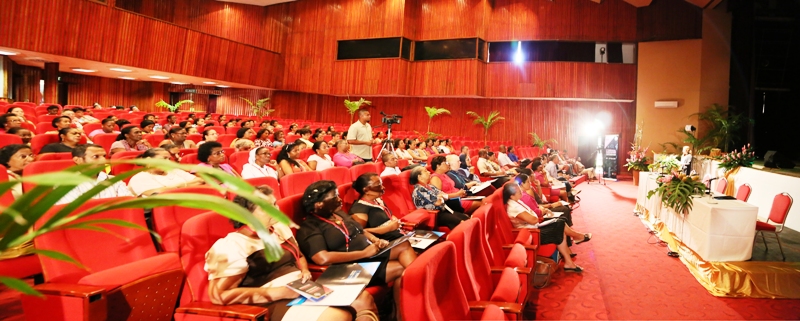
| |
|
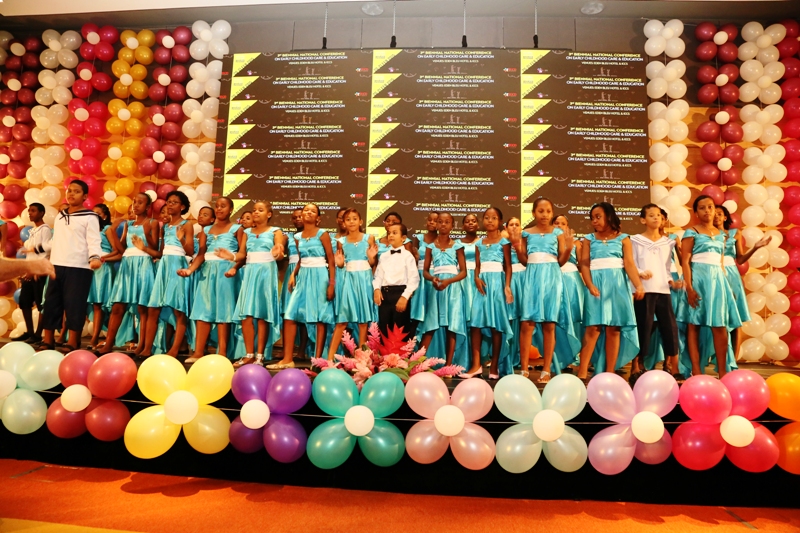
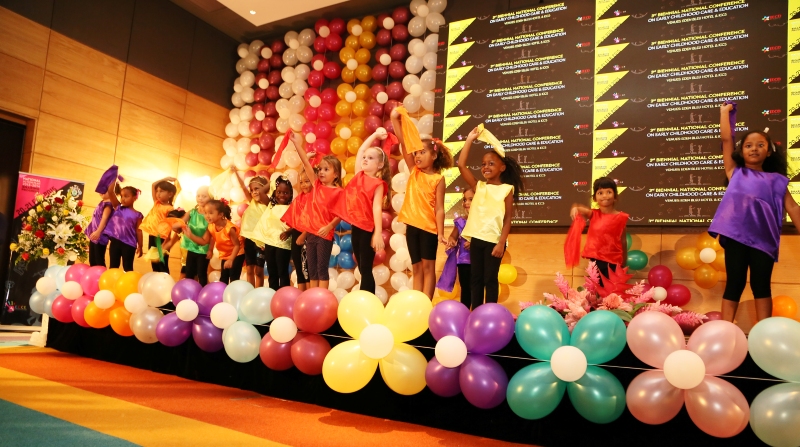
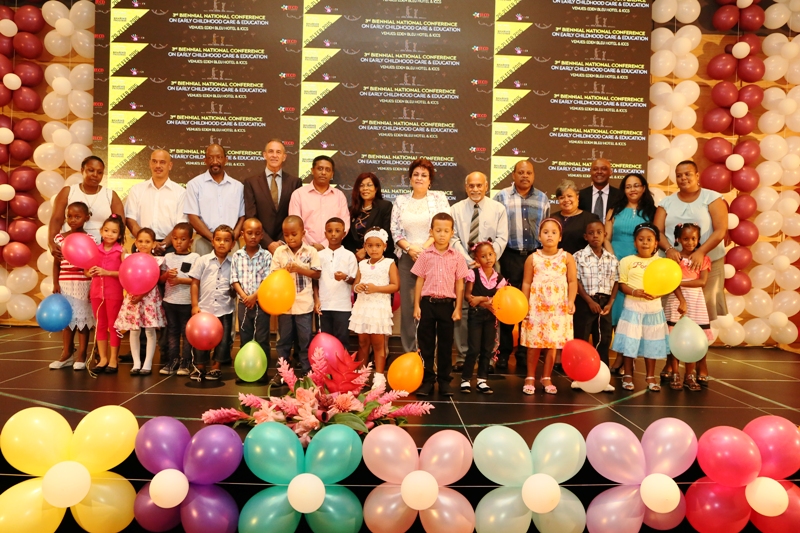
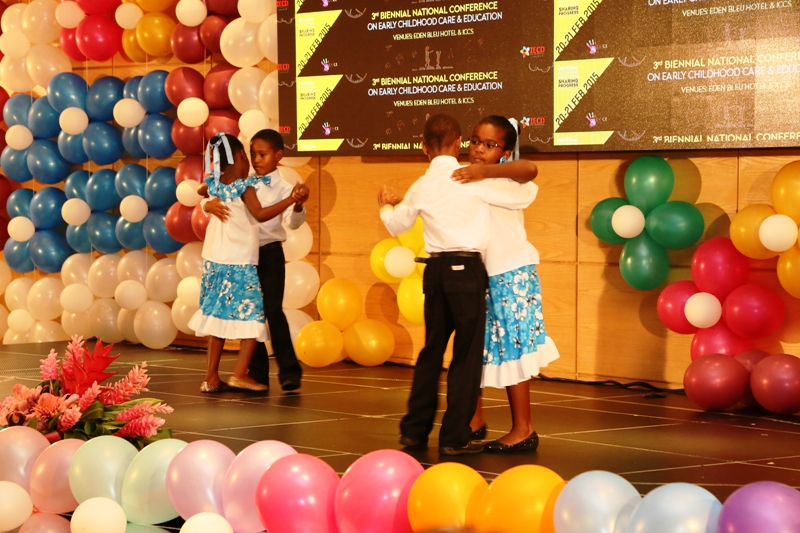
ECCE THEME SONG
Lekel ki kontan mwan isi…
Chorus - child
Lekel ki kontan mwan isi
Lekel ki kontan bann zanfan
Lekel ki pou donn mwan bon valer
Lekel ki kontan mwan isi
Verse 1
La mon ankor enn pti zanfan
Si ou satouy mwan,mon riye
Ler ou kriy ek mwan,mon plere
Mwan, mon zis enn pti inosan
Mon lavi I pli gou ler mon obor ou
Ou lanmour mon bezwen toulezour
Chorus - choir
Lekel ki kontan nou isi
Lekel ki kontan bann zanfan
Lekel ki pou donn zot bon valer
Lekel ki kontan nou isi
Verse 2
Ledikasyon ek swen pou pti zanfan
Proteksyon ek byennet sosyal
Pou ganny bon lasante
Grandi lo en fondasyon solid
Ganny en bon komansman
Dan lavi grandir
Pou vin bann bon et imen
Chorus - choir
Lekel ki kontan nou isi
Lekel ki kontan bann zanfan
Lekel ki pou donn zot bon valer
Lekel ki kontan nou isi
Verse 3
Dan tou sekter
Nou protez ban pti zanfan
Ed zot konn valer lanmour,
Lafeksyon, swen ek respe
Byen edike e grandi an bonn sante
Ansanm pou en meyer sosyete
Labi zanfan, non, non, non,
Last Chorus x2
Ekrir par Georges Payet e enterprete par Lakoral Nasyonal Bann Zanfan




